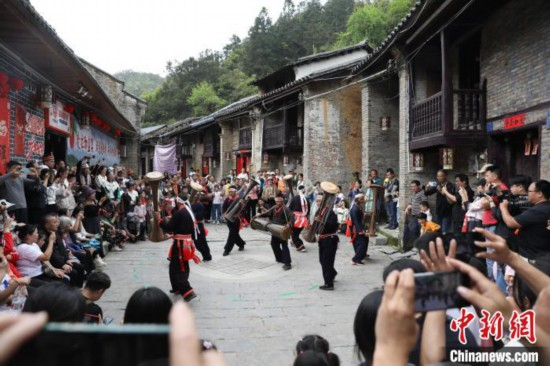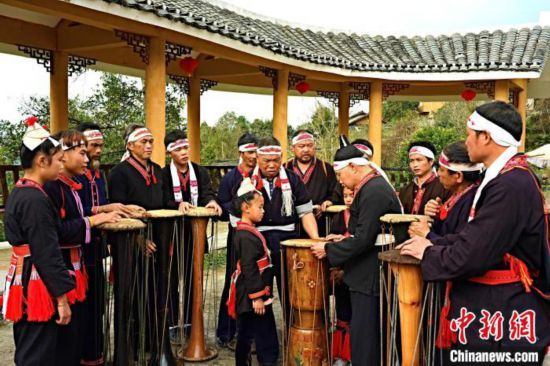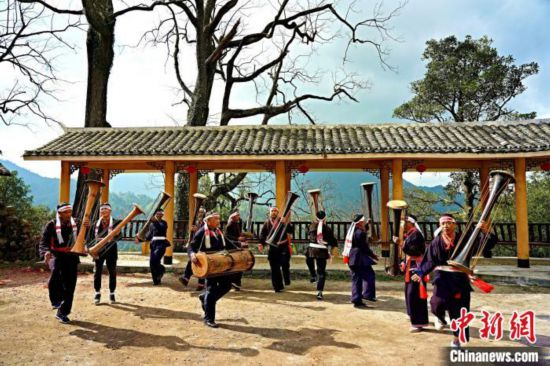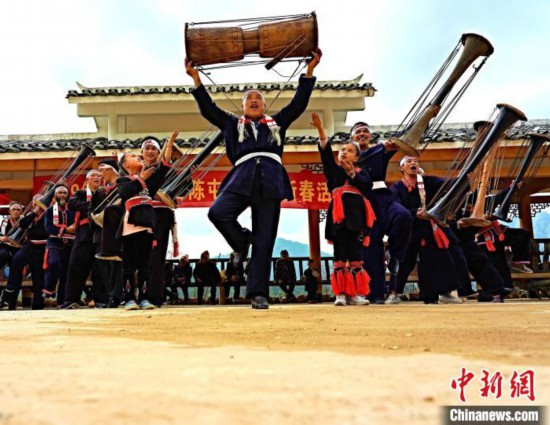
 Print
Print
Yao ethnic group’s Huangni drum dance well-preserved in S China's Guangxi
2024/05/08 15:34 Origin:People's Daily Online
Performances of the Huangni drum dance, a national intangible cultural heritage of China, recently captivated tourists visiting the Jinxiu Yao Autonomous County, south China's Guangxi Zhuang Autonomous Region.

Tourists watch a Huangni drum dance performance of the Yao ethnic group in Liuduan village, Jinxiu township, Jinxiu Yao Autonomous County, south China's Guangxi Zhuang Autonomous Region, on April 12, 2024. (Photo/Zhang Youhao)
Jinxiu Yao Autonomous County, nestled deep in the Dayao Mountains, was the earliest established Yao autonomous county in China. Over the course of centuries, five branches of the Yao ethnic group have thrived here, and have preserved and passed down the rich Yao cultural heritage.
Pan Jinhai is an inheritor of the Huangni drum dance. His family has diligently preserved Huangni drums which have been passed down through numerous generations, and have displayed a remarkable history spanning centuries.

An inheritor imparts the skills of the Huangni drum dance in Liuxiang village, Liuxiang town, Jinxiu Yao Autonomous County, south China's Guangxi Zhuang Autonomous Region. (File photo taken by Gao Rujin)
Pan Jinhai shared a tale surrounding the origin of the Huangni drum dance. According to the tale, King Pan, the ancestor of the Yao ethnic group, tragically lost his life while hunting in the mountains, falling from a cliff. His children discovered his body on a paulownia tree at the foot of the mountain.
In their sorrow, they crafted a drum body from the felled tree, using goat skin for the drumhead and coated it with mud. They performed a dance and beat the drum to mourn King Pan. Since then, the Yao people have continued this tradition as a way to honor their ancestors.

Villagers stage a Huangni drum dance performance in Liuxiang village, Liuxiang town, Jinxiu Yao Autonomous County, south China's Guangxi Zhuang Autonomous Region. (File photo taken by Gao Rujin)
The Huangni drum dance has evolved from a traditional ritual to an artistic performance over the years. Boasting a distinctive allure and artistic value, the art form has gained recognition both at home and abroad.
“The Huangni drum dance has gained greater attention since being acknowledged as a national intangible cultural heritage. The flourishing tourism industry has offered numerous platforms to present this dance. Personally, I have performed it more than 100 times annually. Although some adaptations have been made, the original version has remained the most favored," said Pan Jinhai.

Villagers stage a Huangni drum dance performance in Liuxiang village, Liuxiang town, Jinxiu Yao Autonomous County, south China's Guangxi Zhuang Autonomous Region. (File photo taken by Gao Rujin)
Pan Ningyong, 51, has been immersed in the Huangni drum dance since childhood. He worked away from his hometown to make a living when he was younger. Eventually, he returned to his hometown and began performing the Huangni drum dance with his brother, Pan Jinhai, in different places. They also visited schools to expose students to the dance and developed cultural products associated with the Huangni drum dance.
"In the past, the Huangni drum dance was traditionally performed during festive harvest celebrations and rituals. However, it has since transitioned onto the stage, allowing people to develop a deeper understanding and appreciation for this dance form. Notably, primary and secondary school students have shown a keen interest in the Huangni drum dance and have quickly grasped its techniques, giving me hope for its continued preservation," said Pan Ningyong.
Copyright © CCEDN.COM.CN. All Rights [京ICP备2024049485号-1] Tel: 0086-10-88820521

